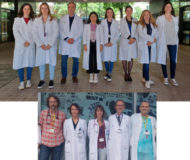

The Sant Pau Research Institute (IR Sant Pau) has been honored with two awards for its research at the recent National Congress of the Spanish Society of Hematology and Hemotherapy (SEHH), held in Palma, reaffirming its leadership in innovative research to improve hematology treatments.
The presentation titled “Phase I/II clinical trial with academic CAR-T30 (HSP-CAR30) for the treatment of Hodgkin lymphoma or CD30+ T-cell non-Hodgkin lymphoma in relapsed or refractory cases: efficacy and safety results”, presented by Dr. Ana Caballero, a researcher from the Cellular Immunotherapy and Gene Therapy Group, was awarded as the Best oral communication in chronic lymphoproliferative syndromes. This academic study on HSP-CAR30, the only anti-CD30 CAR-T product in Europe, demonstrates high antitumor efficacy in patients with relapsed or refractory Hodgkin lymphoma and CD30+ T-cell non-Hodgkin lymphoma. The data show it is possible to achieve durable complete responses in patients with multi-refractory disease, with an adequate safety profile.
The other award went to the presentation titled “Efficacy and safety of reduced-dose cyclophosphamide post-transplantation outside the setting of haploidentical hematopoietic progenitor cell transplantation”, by Drs. Irene García Cadenas and Sara Redondo from the Hematologic Oncology and Transplantation Research Group. This work was recognized as the Best work in the Hematopoietic Progenitor Transplantation section. The study, which initially presented preliminary data from 31 patients, updated its results during the congress to include more than 50 patients who received this therapeutic platform. The research proposes reducing the dose of cyclophosphamide to decrease the drug’s associated toxicity in the context of bone marrow transplantation while maintaining its effectiveness in preventing graft-versus-host disease, one of the most severe complications of the procedure. The results have been so positive that this strategy is now routinely used for most transplanted patients at Sant Pau Hospital, paving the way to improve outcomes, not only in terms of efficacy but also in quality of life.
In addition, researchers from IR Sant Pau presented another study as an oral communication titled “Towards dose individualization of ruxolitinib in patients with corticosteroid-refractory graft-versus-host disease: development and validation of tandem mass spectrometry liquid chromatography”, which stood out for its innovative proposal to personalize treatment in patients with graft-versus-host disease unresponsive to conventional treatments. This multidisciplinary work, in collaboration with the Pharmacy and Biochemistry Departments at Sant Pau Hospital, introduces a new system to measure ruxolitinib levels, the current second-line treatment, and adjust the dose for each patient to minimize risks and improve therapeutic responses. Given the remarkable results of the pilot study, the research will continue with the launch of a multicenter study within the Spanish Group for Transplantation and Cellular Therapy (GETH-TC) in early 2025, led by the Hematologic Oncology and Transplantation Research Group at IR Sant Pau.